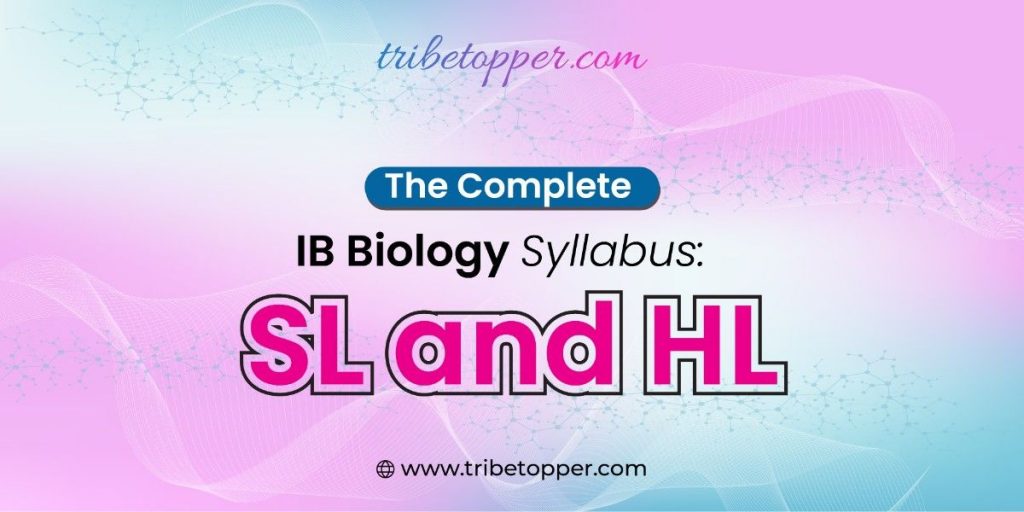
The IB Biology Syllabus lists all the topics, skill applications, and nature of science standards. The IB organization mandates are taught throughout the two years of the IB biology higher-level course. The entire syllabus can be seen here. While SHS does not necessarily progress through the content statement in order, they are presented in order here. If you are curious about the order in which the syllabus is taught.
Let’s explore the complete IB Biology syllabus here –
Core Topics Covered in the Syllabus:
Cell Biology – An organism’s smallest functional collective unit is called a cell. Its size is determined by the surface area to volume ratio. Prokaryotic and eukaryotic cells are the two different types that exist. Where Prokaryote’s cell walls are made of peptidoglycan, a protein-and-carbohydrate combination. The Phospholipids and the proteins they contain make up the continuous structure of the cell membrane. Hydrophilic and hydrophobic refer to two distinct bilayer areas that love and hate water.
Molecular Biology – The four biochemical molecules are carbohydrates, lipids, proteins, and nucleic acids. These molecules work together to facilitate metabolism. We are examining the structure and function of DNA, RNA, and proteins. Investigate the role of molecular biology in genetic inheritance and biotechnology. The topics also combine water, carbohydrates and lipids, proteins, enzymes, cell respiration, photosynthesis, etc.
Genetics – Discover the patterns of inheritance, genetic manipulation, and population study. It is understanding how genetic information influences traits and contributes to biodiversity. It is the study of genes, variation, and inheritance. The morphology of red blood cells altered from biconcave to sickle-shaped. It diminishes their oxygen-carrying capabilities and results in severe anemia, also known as sickle cell anemia. It also includes Chromosomes, Meiosis, Inheritance, Genetic Modification, and biotechnology.
Ecology – Analyzing ecosystems, population dynamics, and human environmental impact. Learn the conservation strategies and sustainable practices to protect biodiversity. This topic explains the species, communities, ecosystems, energy flow, carbon cycling, and climate change. Check on the decomposers, which are organisms that aid in the transformation of organic waste and dead animal and plant matter into inorganic substances.
Evolution and Biodiversity – Study the principles of evolution, species classification, and biodiversity. Discover the impact of evolutionary processes on the diversity of life. Learn about the evolution, natural selection, classification of biodiversity, and cladistics.
Additional HL Topics: In addition to the core topics, HL students dive deeper into specific areas, like –
- Physiology – Discover the functions of different systems in the human body. Understand how physiological processes maintain homeostasis and respond to external stimuli.
- Biochemistry – Investigate the structure and function of biological molecules. We are examining the role of enzymes and metabolism in living organisms.
- Biotechnology and bioinformatics – Explore the applications of biotechnology and the use of bioinformatics in biological research. Understand how advancements in technology contribute to biology research and medical breakthroughs.
Internal and External Assessments:
Internal Assessments – Students carry out these in-depth analyses on their own. You’ll plan experiments, gather information, and assess the results. This element allows you to demonstrate your biological knowledge in practical settings.
External Assessments – These consist of written tests that assess your proficiency with biological ideas. It includes short-answer, multiple-choice, and extended-response questions on these tests.
Study Tips for Approaching IB Biology:
- Active Learning – Engage actively with the online material for IB Biology. Create flashcards, diagrams, and concept maps to reinforce your understanding.
- Practice Past Papers – Get familiar with the exam format by practicing past papers. It helps you understand the types of questions and how to structure your responses.
- Collaborate – Create study groups with classmates to discuss concepts, share insights, and learn from one another.
- Assess Online Resources – Explore the best online platforms like Tribe Topper offers concept videos and animations that can provide visual aids and alternative explanations for challenging topics.
- Seek Assistance – If you’re struggling with a particular concept, do not hesitate to ask your teacher or seek assistance from online resources. Understanding the basics is essential for building more complex knowledge.
Conclusion:
Whether you choose the standard or higher level of IB Biology, understanding the coursework may be rewarding and challenging. One must be ready to take IB biology examinations if one breaks down the essential concepts, comprehends the extra study material for HL students, and uses intelligent techniques.